Back in Business - Part I
Age: 32 Born: November 18, 1971 Turned professional: 1992 Teams: Team CSC (2004- ), Team Telekom...
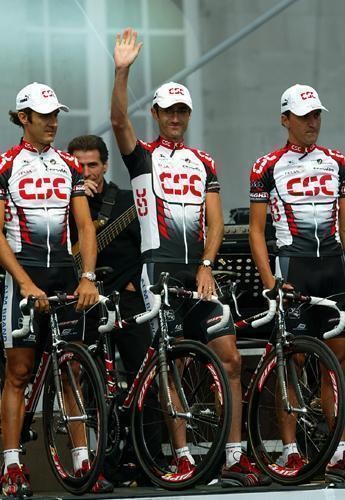
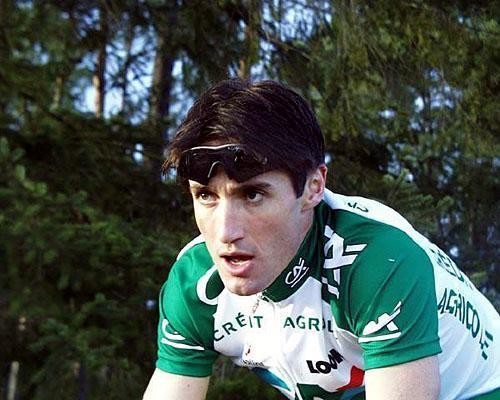
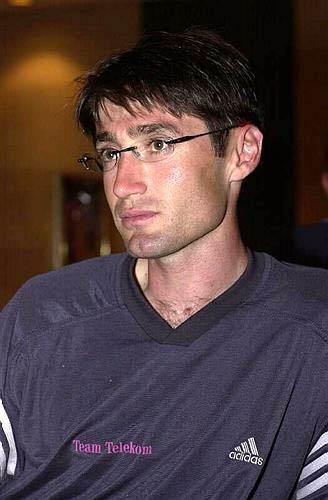
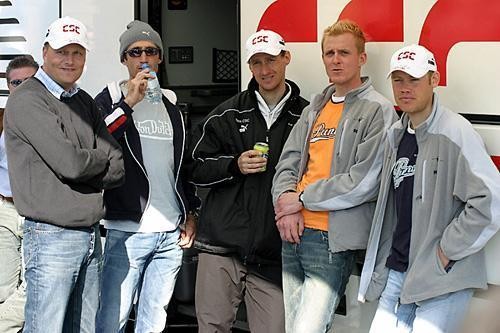
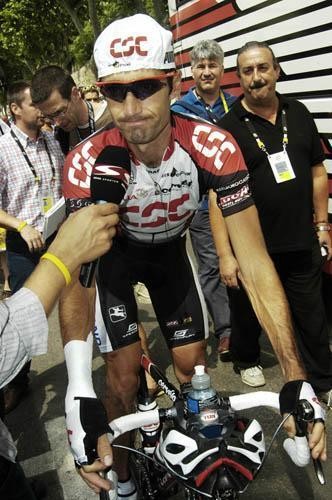
An interview with Bobby Julich, November 10, 2004
Just over 12 months ago Bobby Julich was on the verge of retirement. The then 32 year-old was dropped by Team Telekom and with few offers on the table, things were looking bleak. Had he stopped, it would have been a regrettable fin de carrière for a rider whose palmares included a third place finish in the Tour de France, victories in the Criterium International, stages of the Route du Sud and the Tour de L'Ain plus a ninth place finish in the 1996 Tour of Spain. But then Bjarne Riis and Team CSC stepped forward, offering Julich a place on their roster for 2004 and the chance for a career renaissance. It paid off in spades, as Shane Stokes writes.
Julich had a fine season, moving from a position of 329th in the world rankings at the end of 2003 to 30th this October. Highlights included a superb Olympic debut where he took bronze in the Elite TT in Athens, wins against the clock in the Vuelta a Pais Vasco and the Luk Challenge (the latter with teammate Jens Voigt), second in the GP Eddy Merckx, third in Paris-Nice and fourth overall in the Criterium International, the Vuelta a Pais Vasco and the Dodge Tour de Georgia.
He was also fifth in the ENCO Tour of the Netherlands, eighth in the Tour of the Mediterranean and fifth and ninth in time trials at the Tour de France.
Julich says mental factors are the biggest influence to his return to form, the approach and ambiance within Team CSC perfectly synching with the kind of support structure he needs. Not surprisingly, he is delighted to remain part of the squad for the foreseeable future. There was a delay in confirming his signing due to the team's ongoing push to land a second sponsor, but last month the Danish setup confirmed that he would be staying. Julich has been given a deal for 2005 and 2006.
Talk to Bobby Julich for a couple of minutes and it's clear that there is more to this rider than just the ability to pedal quickly. He comes across as intelligent and articulate, a deep thinker with views on a range of subjects and someone for whom, clearly, morale is crucially important. Conscious of eating into his off-season time, Cyclingnews had lined up a ten minute interview. Once into his stride, however, a chatty Julich spoke for half an hour, discussing a range of topics. These subjects include the five tough years since that podium finish at the 1998 Tour, his return to good form this season, Bjarne Riis' abilities as a motivator and just what is so unique about his current team.
Cyclingnews: It was announced recently that you're on the Team CSC roster again for 2005. You must be pleased with that?
Get The Leadout Newsletter
The latest race content, interviews, features, reviews and expert buying guides, direct to your inbox!
Bobby Julich: Yeah. The whole situation after the Olympics is such that I thought I would have a big card to play. It worked out a little more complicated than that. I think I made the mistake by being honest, and telling people how great this team was. A lot of my friends, teammates and confidants were saying to me that I had kind of painted myself into a corner here because everybody knows I want to stay with Team CSC. Interest from other teams is probably not going to be as high as it might be if they thought that I wanted to leave.
Of course, I didn't want to leave. But there was a situation where Bjarne was finding it hard to come through with a second sponsor...A lot depended on that for signing me. Finally, they worked out a solution and we came to terms, but I had started saying to myself that perhaps this was going to be one of those one-year special things that will never happen again. Thankfully it worked out with getting a new contract.
At CSC our philosophy is to stick together and fight. Obviously isn't a 100 perfect great situation that we don't have a second sponsor right now, but only one of us decided to go to another team. It is because we are so close as a team. It is a great, great feeling, this unit. It was really hard for me when Bjarne was telling me that he didn't have a second sponsor and I had some offers from other teams, but it all worked out. Now we are in it to win it.
I have signed for two more years so I hope to end my career with CSC. I didn't want it to be one of those one-year wonders. I basically have been looking for this team for my whole life, so I didn't want to leave it after only one year! Anyway, I stuck it out and stressed a lot, but it all worked out. Hopefully there will be more news...it would be even better if Bjarne can finally get the signature on a contract from the second sponsor.
CN: I believe once that second sponsor is signed, everybody will end up with a better deal...
BJ: Yes. At the moment, it is everyone making the sacrifice for the good of the team. That is very odd in sport in general, nowadays. There is a free agency market in America, for example. Guys are in one city for one year, and then they have a big deal for two years in another city, and then another big deal two years later. But with our team, loyalty goes a long way, and respect goes a long way. Our philosophy is sticking together. Fighting together paid off last season and we want to just keep the ball rolling, even if we do have to make sacrifices here and there.
CN: Obviously the team has worked for you. You had that great showing the Tour a few years ago, and were with a couple of other teams (Credit Agricole and Telekom) since but never reached the same heights. You were considering retirement last year, but then the Team CSC deal came along. Suddenly you are right back up there with some really good results this season, not least that Olympic bronze medal. What was about Team CSC that turned everything around for you? Was a physical thing, in terms of training, was it a mental thing, was it something to do with the way the team is set up and run?
BJ: I pride myself on being professional, and I believe that in the last five years when I wasn't performing up to my potential, I was still training hard. I was still doing everything that I thought it took to be successful. It just wasn't clicking. As a result, I definitely have to put 80 or 90 percent of the credit down to the mental change.
Bjarne treated me with respect and whole team treated me with respect. I went into the team training camp last December not really knowing if I was going to stick out the whole year or even if I wanted to be a professional bike racer any more. But after our first team meeting, I realised that this team is something special.
Words are one thing, but we stuck together for a whole week and did a lot of team building activities. It was exactly what I needed and exactly what I was looking for my whole career. You have to have people who believe in you, through good times and bad. Not just through the good times. What I felt like at Credit Agricole was just like, "Okay, we paid you have butt-load of money, now go and win the Tour". But they didn't really give me mentally what I needed to succeed.
Changing to Telekom, I was confident that here was a team that really has their act together, and that I would be able to shine again with them. But the day I signed the contract, I remember Kevin Livingston came to my house. We had a bottle of wine and we were talking. He said, 'Listen, Bobby, I hope that you realise that this is Jan and Erik's team - I hope you don't have any real individual goals.' I was kind of taken off by that comment. I said that was kind of negative, the team is a huge team and everyone will have the chance.
But when I did the Tour Down Under, and then went straight to races like the Ruta del Sol and the Tour of Valencia, I realised right away that I wasn't there to do anything other than work for Erik. I am a climber, so that was taking a lot out of my spirit. Then Jan had his problem, and I never even did one race with him. When Vino was there, I was able to work for somebody who had GC hopes; I was with him in Paris-Nice, when we won Paris-Nice, and again when he was riding really well in the Tour of Switzerland until he crashed. I was helping him again the following year, when he won Paris-Nice once more and when he won the Tour of Switzerland. I had much more fun when I was riding for Vino as that is my talent and that is where my spirit is. My spirit isn't getting on the front on the first day of the Tour de France and riding 150 kilometres on the front, doing that for eight more days, then get into the mountains and having nothing left.
It was kind of unfortunate (the approach) but I think that is the way Telekom looks at it. They get a lot of great riders and turn them into mediocre workers. But once your spirit is broken, it is really hard to make the sacrifices and to suffer, when you know you're just basically there to work on the front on the stages that aren't really your forte.
CN: You went to team CSC and obviously things clicked, everything started to work out well again. Was it in the pre-season or in the first race that you suddenly realised that the old Bobby Julich was back?
BJ: Well, I realised that something was different early on with in my attitude. I remember I got back from our training camp and I was on a total high. But then, because of the travel and everything, I got sick. I was like, 'oh no, here we go again.' I didn't really have that much motivation to train through December because I was sick and because of the mental aspect, what I had been dealing with the last five years.
But then on January 1, I remember I went out for a ride and I loved being on my bike again. I took that with me to the first training camp. I remember I got there and I was all jetlagged. Bjarne had us do this maximum test, basically a race up this climb, and I was third to last or fourth to last of the team, out of 25 guys. Basically, I get to the top of the hill and we all have our SRMs on. He comes over and starts playing with the box and looks at my data. He goes, 'How was it?' I said 'Bjarne, I could have gotten off my bike and walked faster. I was just stuck, I couldn't go.' He goes, 'Don't worry, that is not your real level.'
It was a surprise, I was really expecting, 'Oh Julich, come on, what you doing?' because that is what I had been getting the last couple of years. But he just looked at me and said, 'That is not your real level'. I said, 'But Bjarne, I think that maybe that is my real level' but he goes 'Nope,' and just walked away. Right then and there, I thought 'Man, he believes in me! This is new, this is what I need, a person like this my life'.
Sure enough, four days later, we did the exact same test. I think I was fourth or fifth best in the team. Right there and then I knew I had the potential to come back. After that, race after race, I just was gaining confidence and being part of the team. We were in every race and we were dictating most of the races. We were the team that was deciding what break went, and who was in it. We just built on that the whole year.
I had some great results in the spring, had a break, came back and then started with the Tour of Switzerland again where I did okay. Then in the Tour de France I was like, 'Oh my gosh' in the prologue, as I felt so good.
I wasn't sure how I was going to do. The team did an equipment change on me right before the start, which I didn't want. I wanted to use my special chainrings, my O.Symetric chainrings. But I came out to the car, after warming up and doing everything in the morning, training on them and everything, and I came out and they were off my bike. I said, 'What the heck happened'? That was just kind of a mental thing, but it distracted me. Yet once I was in the race I felt really strong.
I had a few problems during the Tour. I crashed in the team time trial and took a couple of days to come back from that. Then I crashed again in the big pileup with one kilometre to go, and took a couple of days come back from that. The point when I started to really feel like I could really do something in the Tour was the first day in the mountains when we finished up La Mongie. At the base of the climb, the guys were attacking with eight kilometres to go, like gangbusters. I was like, 'Okay, be careful here, don't do too much'. Then I said to myself, 'Wait a second. That is the old Bobby Julich's mentality, that of just finishing the race.' In the last five kilometres, I just felt fantastic.
But before I had a chance to build on that something happened. The very next day, on the 13th stage, I crashed and broke my wrist. After that, it was just pure survival. I know if I didn't have the mentality that I had when I came to Team CSC, if I had the same mentality as I had in Telekom or Credit Agricole, I would have dropped out of the race. But there wasn't a question of that. I just said 'No, the team needs me, I need this, the Olympics are coming up.' I suffered through it and I showed myself, more than anyone, exactly what I was about this year.
That ended up paying back in spades in the Olympics when I was able to win the medal.
Click here for Part II of our interview with Bobby Julich, where he talks about the Olympics, Tyler Hamilton, mental motivation, and his upcoming plans.
Other Talking Cycling Interviews